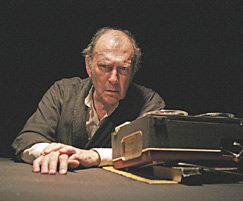 Harold Pinter had one of those deep, dark provocative minds, the scary kind, and he used it to create characters that resembled almost exactly the furtive and often malign creatures that burrow around inside our heads and heart, alternately bullying us and cringing in the corner. I’m thinking of early Pinter here, the Pinter of The Caretaker, The Homecoming and The Birthday Party, plays written between 1957 and 1964 that Portland theaters still occasionally produce. Which makes sense, because there’s really nothing quite like them, the plays that gave us the “Pinter silence” — the tear in the fabric, the hole in the dike. Except for Betrayal, I don’t know the rest of his work nearly as well, and I only know Betrayal because of the excellent film version, adapted by Pinter and starring Jeremy Irons, Ben Kingsley and Patricia Hodge. It has a wistful tone, maybe it’s the score, that takes some of the sting out.
Harold Pinter had one of those deep, dark provocative minds, the scary kind, and he used it to create characters that resembled almost exactly the furtive and often malign creatures that burrow around inside our heads and heart, alternately bullying us and cringing in the corner. I’m thinking of early Pinter here, the Pinter of The Caretaker, The Homecoming and The Birthday Party, plays written between 1957 and 1964 that Portland theaters still occasionally produce. Which makes sense, because there’s really nothing quite like them, the plays that gave us the “Pinter silence” — the tear in the fabric, the hole in the dike. Except for Betrayal, I don’t know the rest of his work nearly as well, and I only know Betrayal because of the excellent film version, adapted by Pinter and starring Jeremy Irons, Ben Kingsley and Patricia Hodge. It has a wistful tone, maybe it’s the score, that takes some of the sting out.
Back to Pinter, who died on December 24, having fought cancer since 2001. As his playwriting career began to wind down, he became more and more political, and his Nobel acceptance speech in 2005 excoriates the role America has played in the world, that record of supporting dictators and expanding our economic interests, and the consistent support Britain provided for our “adventures”, including Iraq.
We leave you with that 46 minute speech, or rather with a link. It circulated widely after he delivered it — by turns angry and bitter, the notes of a man betrayed. But if you didn’t hear it then, maybe it’s a fitting way to see him off today.
 Blaine Truitt Covert/OBT
Blaine Truitt Covert/OBT Still. Of course No Man’s Land is a play, but in its distillation of psychological and philosophical themes and its virtual abandonment of plot, which seems to have been dropped unceremoniously through a trap door in the stage floor, it takes on the musically suggestive qualities of dance. And of course Carmen is a ballet. But as Bizet and his opera librettists, Henri Meilhac and Ludovic Havely, devised it (they were working from an earlier novella by Prosper Merimee, who in turn may have been working from a narrative poem by Alexander Pushkin) the story is indisputably theatrical, a twisting and exciting tale of action and big moments leading thrillingly to tragedy. Stowell chose to keep those elements — indeed, Bizet’s music almost demands it — creating an uncompromisingly theatrical ballet. Fonte, working with Stravinsky’s jagged and compellingly modern score and incorporating a good deal of Fokine’s original movement style, took an opposite approach, distilling almost to the point of pure dance Petrouchka‘s sad folk tale of a puppet who comes to life, falls in love, and is murdered. (It’s a tough fate: all Pinocchio got was a long nose and a short stint in a whale’s belly.)
Still. Of course No Man’s Land is a play, but in its distillation of psychological and philosophical themes and its virtual abandonment of plot, which seems to have been dropped unceremoniously through a trap door in the stage floor, it takes on the musically suggestive qualities of dance. And of course Carmen is a ballet. But as Bizet and his opera librettists, Henri Meilhac and Ludovic Havely, devised it (they were working from an earlier novella by Prosper Merimee, who in turn may have been working from a narrative poem by Alexander Pushkin) the story is indisputably theatrical, a twisting and exciting tale of action and big moments leading thrillingly to tragedy. Stowell chose to keep those elements — indeed, Bizet’s music almost demands it — creating an uncompromisingly theatrical ballet. Fonte, working with Stravinsky’s jagged and compellingly modern score and incorporating a good deal of Fokine’s original movement style, took an opposite approach, distilling almost to the point of pure dance Petrouchka‘s sad folk tale of a puppet who comes to life, falls in love, and is murdered. (It’s a tough fate: all Pinocchio got was a long nose and a short stint in a whale’s belly.)